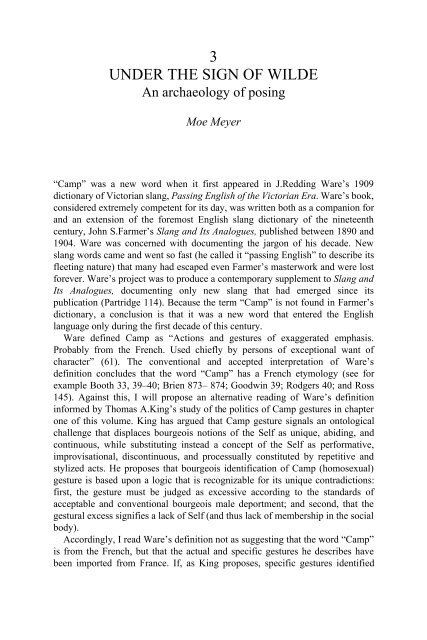Edited by Moe Meyer - Get a Free Blog
Edited by Moe Meyer - Get a Free Blog
Edited by Moe Meyer - Get a Free Blog
Create successful ePaper yourself
Turn your PDF publications into a flip-book with our unique Google optimized e-Paper software.
3<br />
UNDER THE SIGN OF WILDE<br />
An archaeology of posing<br />
<strong>Moe</strong> <strong>Meyer</strong><br />
“Camp” was a new word when it first appeared in J.Redding Ware’s 1909<br />
dictionary of Victorian slang, Passing English of the Victorian Era. Ware’s book,<br />
considered extremely competent for its day, was written both as a companion for<br />
and an extension of the foremost English slang dictionary of the nineteenth<br />
century, John S.Farmer’s Slang and Its Analogues, published between 1890 and<br />
1904. Ware was concerned with documenting the jargon of his decade. New<br />
slang words came and went so fast (he called it “passing English” to describe its<br />
fleeting nature) that many had escaped even Farmer’s masterwork and were lost<br />
forever. Ware’s project was to produce a contemporary supplement to Slang and<br />
Its Analogues, documenting only new slang that had emerged since its<br />
publication (Partridge 114). Because the term “Camp” is not found in Farmer’s<br />
dictionary, a conclusion is that it was a new word that entered the English<br />
language only during the first decade of this century.<br />
Ware defined Camp as “Actions and gestures of exaggerated emphasis.<br />
Probably from the French. Used chiefly <strong>by</strong> persons of exceptional want of<br />
character” (61). The conventional and accepted interpretation of Ware’s<br />
definition concludes that the word “Camp” has a French etymology (see for<br />
example Booth 33, 39–40; Brien 873– 874; Goodwin 39; Rodgers 40; and Ross<br />
145). Against this, I will propose an alternative reading of Ware’s definition<br />
informed <strong>by</strong> Thomas A.King’s study of the politics of Camp gestures in chapter<br />
one of this volume. King has argued that Camp gesture signals an ontological<br />
challenge that displaces bourgeois notions of the Self as unique, abiding, and<br />
continuous, while substituting instead a concept of the Self as performative,<br />
improvisational, discontinuous, and processually constituted <strong>by</strong> repetitive and<br />
stylized acts. He proposes that bourgeois identification of Camp (homosexual)<br />
gesture is based upon a logic that is recognizable for its unique contradictions:<br />
first, the gesture must be judged as excessive according to the standards of<br />
acceptable and conventional bourgeois male deportment; and second, that the<br />
gestural excess signifies a lack of Self (and thus lack of membership in the social<br />
body).<br />
Accordingly, I read Ware’s definition not as suggesting that the word “Camp”<br />
is from the French, but that the actual and specific gestures he describes have<br />
been imported from France. If, as King proposes, specific gestures identified


